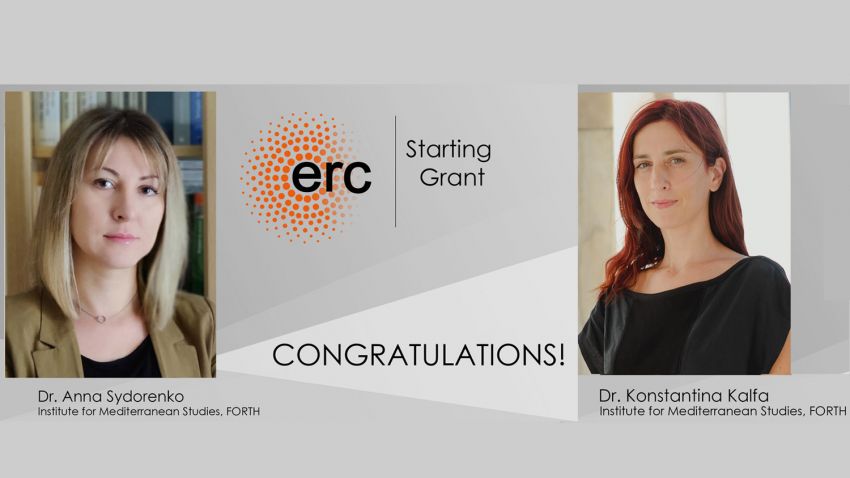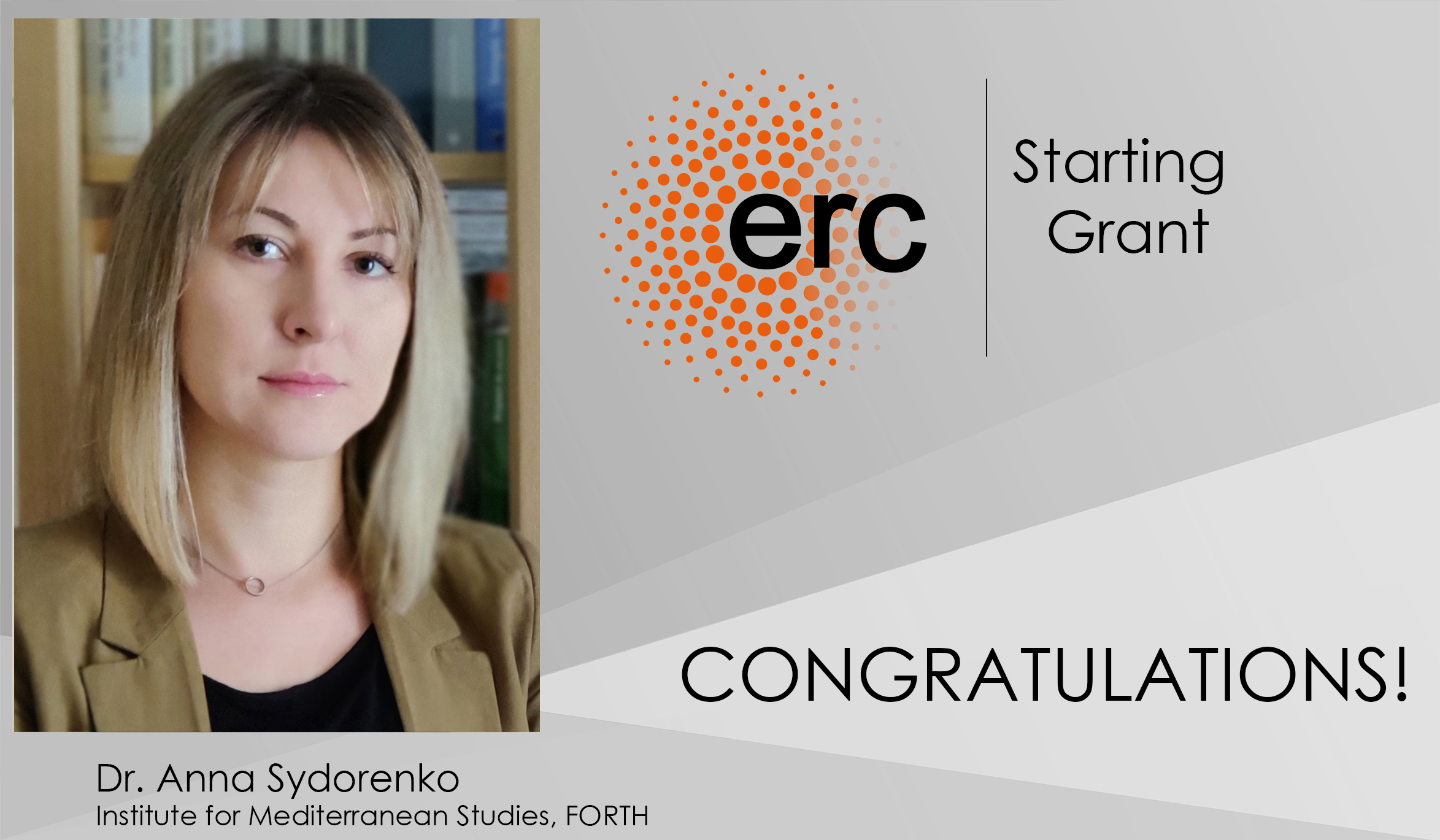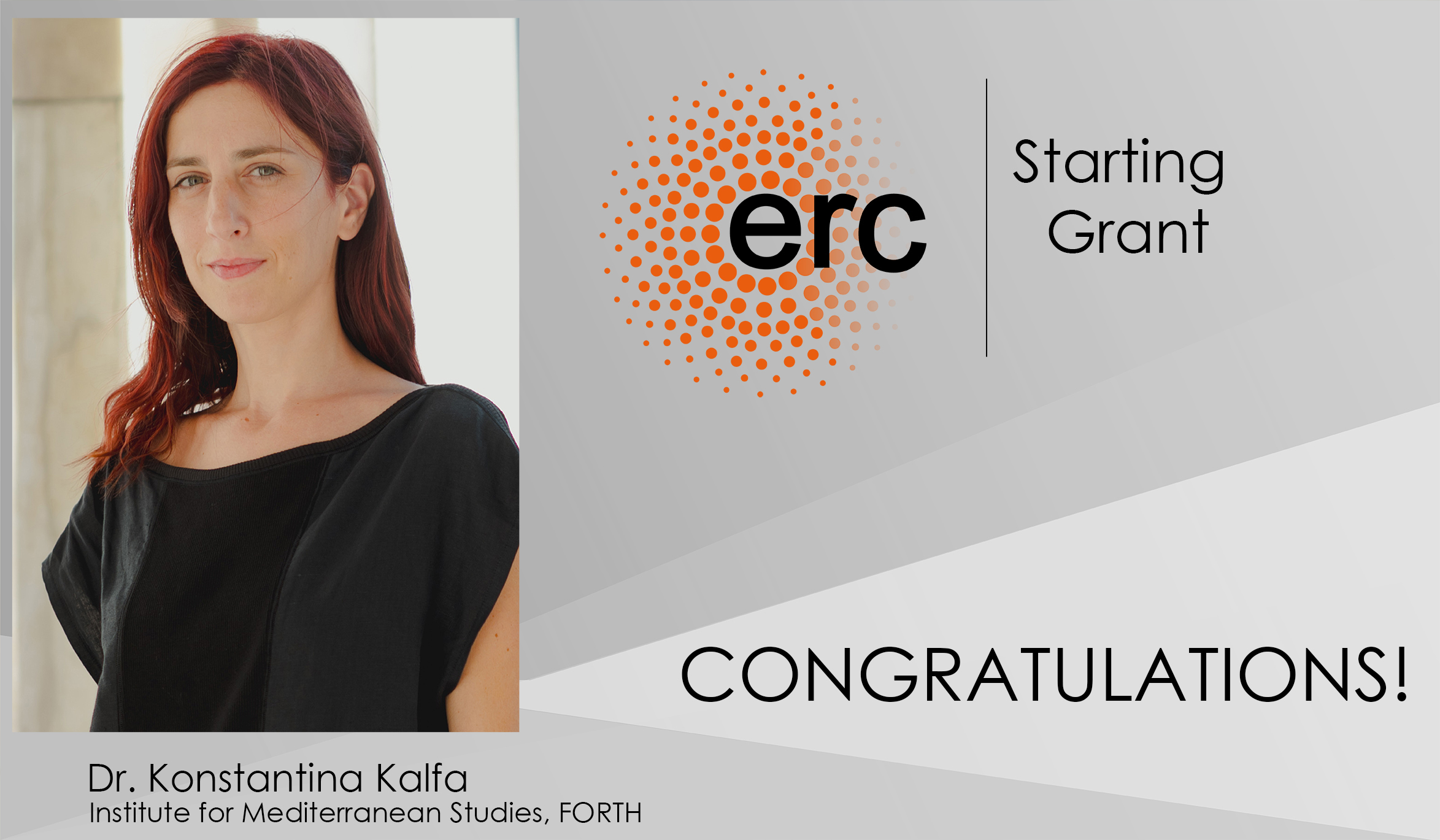All Science News

FORTH attracts new funding from the European Research Council
Two ERC Starting Grants totaling approximately 3 million euros, were awarded to Dr. Anna Sydorenko and Dr. Konstantina Kalfa, post-doctoral researchers at the Institute for Mediterranean Studies of the Foundation for Research and Technology-Hellas (FORTH). It is worth noting that out of 494 grants, these are the only two given in Greece. The funding - totaling nearly €780 million - supports cutting-edge research in a wide range of fields, from life sciences and physics to social sciences and humanities. It will help researchers at the beginning of their careers to launch their own projects, form their own research teams and pursue their most promising ideas.
“Over the past years, FORTH’s Institute for Mediterranean Studies, has emerged as a champion in attracting highly competitive ERC funding, being the only Institute in Greece in the realm of social and humanitarian sciences which has thus far attracted nine ERC grants. This significant success is proof of the excellence of FORTH’s researchers, who have secured 45 ERC grants in total, the highest number in the country, making us all very proud!” says Prof. Nektarios Tavernarakis, FORTH’s President.
Dr. Anna (Ganna) Sydorenko, a postdoctoral researcher at the Institute for Mediterranean Studies (IMS-FORTH), has been awarded the prestigious European Research Council (ERC) Starting Grant. This highly competitive grant is given to exceptional early-career researchers who have two to seven years of experience since earning their PhD (or equivalent degree). The ERC Starting Grant supports young and promising scientists, enabling them to establish independence and build their own research teams in Europe. Dr. Sydorenko's achievement is a significant recognition of her scientific potential and expertise.

The research interests and expertise of Dr. Sydorenko revolve around maritime economic and social history, Black Sea and Mediterranean port cities history, and Greek diaspora. The project of Dr. Sydorenko, entitled “STASH: Shadow Trade: Unraveling Maritime Smuggling Between the Russian and Ottoman Empires (1853-1914)”, aspires to advance our knowledge of inter-imperial relations beyond conventional geopolitical approaches. Understanding the smuggling seascape and how these two neighbouring powers navigated their shadow relations adds depth to our comprehension of the broader Eastern European economic, social, and political relations and introduces new layers to our appreciation of the region’s modern history. This project focuses on the less-explored area of illegal trade relations in the context of evolving conflicts between the empires, the changing landscape of legal trade during an era of increasing globalization, and the shift from sail to steam technology. Specifically, it will comprehensively analyse various facets of the smuggling of both goods and people within the established trade routes, connections, and networks. The analysis will examine the macrostructure of the smuggling linkages, focusing on the hinterland of production/origin of clandestine trade and the foreland, the destination of material and human cargoes. It aims to identify the main nodes of export and import and the means of transportation. The STASH project will delve into who participates in these activities, the methods and timing of partnership formation for such endeavours, the prevailing practices, established routes, and the responses of the empires to the problem of smuggling. Furthermore, we will explore the intricacies of the legal systems within the empires involved to understand how smuggling was prosecuted and how the central state and periphery adapted to address the challenges posed by smuggling activities.
This endeavor will be anchored in a newly introduced smuggling network model, which offers a structured framework and a comprehensive methodological approach for thoroughly investigating the subject matter. It takes a multifaceted approach, serving as a bridge between different linguistic and national narratives and disciplinary assumptions. By delving into the nuanced history of smuggling from the perspectives of various empires, the project aims to make significant contributions to Modern History, Political History, Economic History, Maritime History, and studies of empire. On a societal level, the project will make a significant contribution by offering a historical perspective on phenomena that have contemporary political, geopolitical, economic, and social impacts in both times of peace and times of war. The new historical insights into the smuggling of goods and people in the Black, Azov Seas, and Southeastern Mediterranean will provide the general public with valuable tools to develop a deep understanding of this issue over time. The research team – composed of Dr. Sydorenko (Principal Investigator), three senior researchers, six post-doctoral fellows, and three PhD candidates – will study a variety of unpublished sources in Ottoman Turkish, Arabic, Ukrainian, Russian, English, French and Greek. The team will produce an open access digital portal containing abstracts of deliverables, multimedia material, bibliography and links to be used by the international academic community. It will also organise and participate in a number of workshops and international conferences, it will produce various publications – including two collective volumes – in open access, as well as three Ph.D. dissertations, and a documentary film.
Dr. Konstantina Kalfa, an architectural historian studying housing within the context of postwar development and modernization, earned an ERC Starting Grant. The ERC Grants are Europe’s frontier research funding, supporting early-career scholars in building their own teams and conducting pioneering research across all disciplines.

Hosted at the Institute for Mediterranean Studies of FORTH, the project of Dr. Kalfa, entitled ‘MCH-EsMed: How the middle class housed itself in the Eastern Mediterranean’, is a material culture study of class, family, gender, and politics in the Eastern Mediterranean and beyond. As apartment living takes center stage in today’s global metropolises, the project leverages burgeoning scholarship, untapped archives, new tools, and oral history to document and analyze the similarities among the multi-floor condominiums that fully refurbished four prominent cities in the region after WWII: Athens, Ankara, Tel Aviv and Cairo.
MCH-EsMed will frame these built environments less as forms of vernacular (as the product of quid-pro-quo arrangements and local know-how) and more as tangible evidence to unpack the rapid socio-political transformations on these margins of Europe during the second half of the 20th century. A key premise of this research is that apartment housing in the region reflected both the postwar global promise and local aspirations for improved living conditions and achieving middle-class status, shaped, as they were, by postwar policies for modernization and economic development, political crises, conflicts, and migration flows. In this regard, the project traces trajectories that expand far beyond the region’s understanding as a connected cultural sphere—with the Ottoman Empire often identified as the common denominator—by comparing multiple physical and perceived scales of data and localities, from the international flows of American and European expertise down to the scale of the flat and the lived experiences associated with it.
By engaging a large team of experts, the project aims to generate new knowledge in the following areas: foreign and local debates and policies on housing and development in the region; the spread and key producers of these condominiums (leveraging GIS and machine learning tools); the identities, roles, and experiences of domesticity; and the micro-history of selected building types, all aiming to contribute to the critical understanding of housing as an important historical factor in the current explosive reality in the region.
494 early-career researchers have been awarded European Research Council grants in this year’s first completed ERC call for proposals. The grants, worth in total €780 million, are part of the EU Research and Innovation programme, Horizon 2021-2027. It is worth noting that FORTH is at the top with the largest number of ERC funded projects in Greece, with an inflow of more than € 62,8 million.
The ERC official press release: https://erc.europa.eu/news-events/news/erc-2024-starting-grants-results
Short CVs
Dr. Anna (Ganna) Sydorenko
Dr. Anna (Ganna) Sydorenko, born in Simferopol, USSR in 1983, is a historian who studied Political Science at the National and Kapodistrian University of Athens and earned her Ph.D. in Economic history at the Ionian University, Corfu in 2017. Her research interests span a wide range of subjects, such as maritime economic and social history, port history, Black Sea history, maritime labour history and the Greek diaspora, while she has authored a number of articles and she is co-Editor in the Mediterranean Seafarers in Transition. Maritime Labour, Communities, Shipping and the Challenges of Industrialization 1850-1920s (Brill 2023).
Dr. Sydorenko has been the recipient of a number of competitive scholarships among them: THALIS, "The Black Sea and its port-cities, 1774-1914. Development, convergence and linkages with the global economy", (http://blacksea.gr/), financed by the Greek National Strategic Reference Framework, the E.U. and the Greek Ministry of Education (2013-2015) and Annual 17th Programme of research Grants and educational Scholarships for foreigners 2011-2012, Alexander S. Onassis Public Benefit Foundation. After the completion of his PhD she worked as post-doctoral fellow in two ERC-Starting Grants: «Seafaring Lives in Transition. Mediterranean Maritime Labour and Shipping during Globalization, 1850s-1920s”, ERC Starting Grant 2016, PI – Apostolos Delis. IMS/ FORTH (04/2017-09/2021) and Janissaries in Ottoman Port-Cities: Muslim Financial and Political Networks in the Early Modern Mediterranean”, ERC Starting Grant 2019, PI – Yannis Spyropoulos. IMS/ FORTH (10/2020-09/2024).
Dr. Sydorenko is co-editor of Brill’s new Mini-series in Economic and Maritime Studies and member of the Administrative Council of the Greek Economic History Association. She is also a member of number of international scientific associations.
Dr. Konstantina Kalfa
Konstantina Kalfa earned her PhD in architectural history and theory at the National Technical University of Athens, Greece. She is the recipient of numerous awards and highly competitive grants, including the PI Research Grant from the Hellenic Foundation for Research and Innovation and the General Secretariat for Research and Technology for her project Antiparochì and (its) architects: Histories of social forces, spatial politics and the architectural profession in Greece, 1929-74 (2018-2021). Her publications on housing and architecture’s political economy and production mechanisms appear in edited volumes including Architecture in development: Systems and the emergence of the Global South, critically acclaimed as a ‘timely book address[ing] a major blind spot in contemporary architectural scholarship,’ and esteemed journals in the field: Architectural Histories; PLATFORM-Provocative, Timely, Diverse; the Architecture beyond Europe Journal; the Journal of the Society of Architectural Historians; Rethinking Marxism and Architecture and Culture. Kalfa also co-created the documentary film Antiparochì-A short introduction, presenting her oral history research on the Greek land-for-flats system antiparochì and co-edited the Section ‘Small-scale building enterprise and global home ownership in the age of economic expansion’ of ABE Journal 19 (2022). She is the author of the book Self-sheltering now! The invisible side of the U.S. aid to Greece [in Greek] (Athens: Futura, 2019), praised in prominent daily journals and on the Greek State Broadcasting Corporation radio, and cited in a documentary, a theater play held at the esteemed Athens Epidaurus Festival, as well as in a series of Greek and international books and academic articles in peer-reviewed journals.







